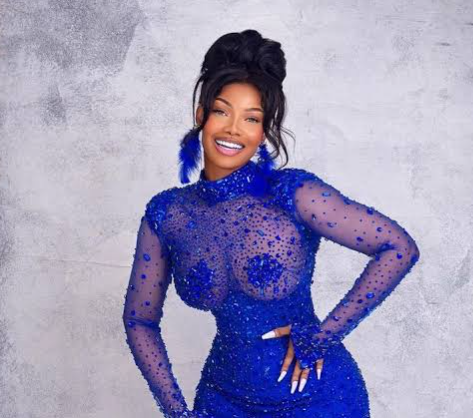
“My Generation is the Dumbest and Most Cowardly” – Tacha’s Explosive Rant Sparks Nationwide Debate

In a now-viral social media outburst that has left many Nigerians stunned, former Big Brother Naija star, Anita Natacha Akide, popularly known as Tacha, has branded her generation of Nigerians as “the dumbest and most cowardly,” triggering a fiery wave of backlash, support, and introspection across the country. The reality TV star and influencer, who rose to fame for her bold personality and unfiltered opinions during the 2019 edition of BBNaija, did not hold back in her recent public criticism of young Nigerians, accusing them of willful ignorance and a lack of spine in confronting the country’s deep-seated issues.
Tacha’s statement, shared in a fiery Instagram live session, has since been trending across Nigerian social media platforms, with her exact words echoing across Twitter, TikTok, and Facebook: “My generation of Nigerians is the dumbest and most cowardly ever! We don’t read, we don’t question, we just follow blindly. Everybody is a clown in this country.” The bluntness of the declaration was matched only by the passion in her voice, as she appeared visibly angry and frustrated, pointing fingers at the youth for allegedly choosing vibes and vanity over values and action.
Her tirade seemed to have been triggered by the reactions she received after publicly criticizing Nigerian leaders and calling out the apparent apathy of many young people in engaging with political and socio-economic matters. According to Tacha, too many young Nigerians are obsessed with entertainment, celebrity gossip, and lifestyle trends, while the nation’s institutions crumble, insecurity rises, and corruption spreads like wildfire. “It’s always about who’s dragging who, who’s dating who, who bought what—yet when it’s time to take a stand, everybody disappears,” she said.
As expected, the backlash came swiftly. Some Nigerians slammed her as being arrogant and hypocritical, accusing her of benefiting from the same superficial social media culture she now condemns. “Isn’t this the same Tacha who built her entire brand on clout and BBNaija drama?” one Twitter user asked. Others described her comments as insulting and generalized, arguing that many Nigerian youths are working hard, speaking up, and sacrificing for a better future despite the challenges.
However, not all responses were critical. A large segment of social media users surprisingly agreed with her sentiments, praising her for saying what many are afraid to admit. Some noted that Tacha, despite her controversial past, had a point—young Nigerians do often appear more concerned with fleeting trends than systemic change. “Tacha is right. We are more interested in Olamide’s album than police brutality. We’ll drag each other for days online, but when it comes to elections or protests, we suddenly go mute,” said one popular youth activist on X.
The debate that has followed Tacha’s remarks reflects deeper tensions within Nigeria’s Gen Z and millennial populations, many of whom feel trapped in a system that offers little hope, yet equally struggle to come together and drive transformative change. While the #EndSARS protests of 2020 offered a brief moment of youthful resistance and unity, the violent crackdown that followed left many disillusioned and wary. Tacha referenced this in her rant, saying, “After the massacre, everyone ran back to their phones. We should’ve kept the fire burning, but we chose silence. Fear. Distractions. That’s not how change works.”
Interestingly, some prominent figures in entertainment and politics have weighed in on the issue. Media personality Denrele Edun called Tacha “bold and brutally honest,” adding that “we need more people to shake the table.” Meanwhile, Senator Shehu Sani tweeted cryptically, “Sometimes it takes a storm to awaken a sleeping generation,” fueling speculation that even within political circles, her words struck a nerve.
Beyond the buzz and noise, Tacha’s comments raise questions that cannot be easily dismissed. Are young Nigerians truly disengaged from national matters? Is the obsession with social media culture a form of escapism or a reflection of deeper societal decay? And most importantly, how do you mobilize a generation that’s been failed repeatedly by its leaders without alienating or insulting them?
Tacha, never one to back down from a fight, has since doubled down on her comments. In a follow-up post, she declared, “I said what I said and I won’t apologize. If it stings, maybe it’s because it’s true.” She went on to encourage young Nigerians to start educating themselves, question authority, and stop depending on celebrities or influencers to speak up on their behalf. “We’re all we have. The earlier we understand that, the better.”
This isn’t the first time Tacha has stepped into political commentary. Over the years, she has lent her voice to various social causes, including women’s rights, youth empowerment, and good governance. While her style is often abrasive and controversial, her influence is undeniable—her millions of followers ensure that every word she utters makes waves.
It remains to be seen whether this latest outburst will lead to any tangible action or simply fade into the daily churn of online controversies. But one thing is clear: Tacha has once again forced a conversation, and like her or hate her, she has made people talk. Her critics may scoff and her fans may cheer, but both sides are now confronted with uncomfortable truths about apathy, distraction, and the dire state of national consciousness among the youth.
In a country battling unemployment, inflation, poor infrastructure, and rising insecurity, Tacha’s words hit differently. For some, they sting because they reflect a bitter truth they don’t want to admit. For others, they are a much-needed wake-up call. And for Tacha, it seems, they are a warning: that until her generation rises above ignorance and fear, the future of Nigeria remains bleak.
Whether her words will ignite action or be lost in the echo chamber of viral trends is yet to be seen. But for now, the mirror has been held up. And it is Nigeria’s youth who must decide whether to look away—or confront what stares back.


